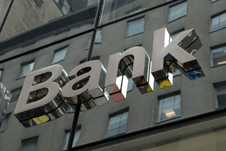Banking Tips: Dealing with a Bank
- Banking tips: how best to deal with your bank on checking accounts, money market accounts, and more
You are not married to your bank, but you can enjoy a nicer long-term relationship if you try these banking tips for obtaining attractive interest rates, low bank fees and solid service for your bank accounts -- including checking accounts, money market accounts, savings accounts and more. There is always something you can do differently or better to make you feel more comfortable and more "at home" with your bank... and perhaps save some time and money, too.
- Ask yourself, and your bank, if you're getting the best deal - About once a year, talk to a customer services representative at your bank to make sure you're signed up for the right banking programs to meet your needs. Maybe a simple adjustment to your banking practices - such as having your paycheck automatically deposited into your checking account - can get you a higher interest rate or reduce or eliminate certain bank charges. Perhaps a change in your banking habits will help cut your bank fees. Maybe your good track record at the bank will qualify you for a lower interest rate on a loan or credit card. Or maybe there is just a new or better bank account that you did not know about. At my bank, I asked a representative for any banking tips that would help me obtain a better deal on my checking account because I was paying a minimum balance fee and receiving no interest. I was told that because I had additional funds in a money market account, I was now eligible for an interest-earning, no-minimum balance checking account. That is a good deal, but I was not aware of it until I raised the question.
Every three or four years (if not more often), compare banks to see if you could do significantly better at another one. Start by listing the banking products and services you really use—most likely checking accounts, money market accounts, ATM cards and one or two others. Make a note of the bank rates, minimum balance requirements and so on. Then go to your bank statements for the last year or so and calculate the bank fees and penalties you typically pay -- monthly bank account maintenance fees, ATM fees, bounced check fees, etc. Now compare your bank with three or four others. You might discover that you can earn or save hundreds of dollars by using another bank. Or, better yet, you may find that your own bank still offers a good value or that it is willing to make concessions to keep you as a customer. In that case, there is little reason to go through the trouble of switching banks. If you decide to leave your bank, see: Switching Banks: How to Change Banks.
For more banking tips about how to get the best deals from a bank, see Reduce Bank Fees: How to Pay Less in Bank Fees.
- If deposit insurance is important to you, make sure your bank funds are fully protected - Be sure that your bank deposits are in a federally insured institution. For more details, see: Is My Money Safe in My Bank Account: FDIC Insurance.
- Simplify your life. Your bank can arrange for the "direct deposit" of your pay and benefit checks and other regular income into your bank account / checking account. Most experts agree that direct deposit is safer and more convenient than paper checks. There are no delays in getting funds deposited because checks are not lost in the mail, forgotten at home or waiting for you to return from vacation. As mentioned previously, you might even get a break on your checking account if your paycheck is deposited electronically.
You also can have your bank automatically make some of your regular payments directly out of your bank account / checking account, such as your mortgage, health insurance premiums, utility bills and investments in a mutual fund. That can be an easy, economical alternative to writing and mailing a lot of checks each month. Also think about doing other banking the high-tech way, such as withdrawing money from ATMs instead of standing in line at the branch or rushing to get to the branch during banking hours. Consider using a bank debit card or check card to pay for purchases from your checking account without writing a check. Banking from home, by phone or computer, also can be a time-saver.
- Get to know bank employees you can turn to for help. Write down the names and numbers of bank employees who, in-person or over the phone, seem to be especially helpful and knowledgeable. If possible, become a familiar voice or face to them. Why go to this trouble? A good bank teller, branch manager, customer service representative, loan officer or supervisor can help get your banking questions answered and your bank problems solved. They may even come to your aid in a financial emergency, especially if they know you and that you have a good relationship with the bank.
- Do not be afraid to make a complaint at your bank. No bank employee really enjoys hearing from a disgruntled customer. But your bank's managers probably would prefer you bring a banking problem to their attention and be given the chance to fix it rather than take your business elsewhere or tell all your friends about "that lousy bank." If you do not get satisfaction from a customer service representative or another employee, consider talking to a bank supervisor...or even one of your banker buddies mentioned in the previous item. And if you are still having problems, consider contacting the banking institution's federal regulator. For more banking tips about how to resolve a dispute with your bank, see Report Bank Complaints or Problems: Who Regulates Banks?.
- Do not be afraid to ask your bank for a break. Bounce a check for the first time ever? Want a copy of an old monthly bank statement? Think the fees for your mortgage application are a bit high? Depending on the circumstances, your bank might be willing to reduce or waive a bank fee or penalty, especially if you have been a good bank customer and do not have a history as a "repeat offender." Also consider talking to your banker if you are having problems repaying your bank loan. Explain the situation and any unusual circumstances. Many lenders will agree to temporary or permanent reductions in your loan interest rate, monthly payment or other charges. Again, it helps if you have had a clean record in the past.
- Read your monthly bank statements. Your bank statements, credit card bills and other mailings from your bank may not make for exciting reading, but they can be among the most important literature you will read. Tucked inside any envelope from your bank could be your only notice about new bank fees or penalties for certain bank accounts. If you are not aware of these changes, and you do not notice the higher bank fees on your next monthly statements, you could end up paying more for your banking and not even realize it.
Also review your bank statement as soon as possible after it arrives to make sure there are no unauthorized charges. If you suspect that a thief has used one of your checks or your credit card, go right to the phone and call the bank. Under most state laws, you are required to exercise "reasonable promptness" in examining any bank statement that shows payments from your bank account.
How quickly you report a problem with an ATM debit card could be especially important in limiting your losses. Your maximum loss is just $50 if you report your ATM debit card lost or stolen within two business days of discovering the problem. But if you wait between two and 60 days, you can be liable for up to $500 of what a thief withdraws. Wait more than 60 days after receiving a bank statement with an unauthorized ATM transfer and you may be responsible for all the money withdrawn. You are not responsible for funds withdrawn after you notify the bank that the ATM card is lost or stolen.
Another good reason to look at your bank statement as soon as possible is to make sure you have enough in your checking account to avoid bounced checks.
- Read the fine print. Knowing the costs and requirements of a bank account before you sign on the dotted line can prevent a bank complaint or hassle later. Example: Just because a bank account is advertised as "free" or "no cost" does not mean you will never run up bank costs. A banking institution is not allowed to advertise a free checking account if you could be charged a bank account maintenance fee or activity fee (such as for going below a required minimum balance). But your bank can offer a free bank account and still impose bank charges for certain services, such as check printing, automated teller machine (ATM) use, and bounced checks. Also, ask your bank if an attractive interest rate on a credit card or a deposit is really just a short-term, introductory "teaser" rate.
- Keep good bank records. Hold on to your bank receipts for deposits, ATM withdrawals, credit card charges, and other bank transactions long enough to confirm that your monthly bank account statements (or credit card statements) are correct. Later it's OK to toss these pieces of paper in the trash, but be sure to rip them up enough so that a thief cannot read or use them. Also, keep copies of any contracts or other documents you sign with the bank (loans, certificates of deposit, etc.), along with any accompanying materials. If there is ever a dispute or a discrepancy with your bank, you will have those documents to refer back to.
- Use your bank as an information resource. A good banker can be an excellent source of advice and information -- not just for banking tips but also about starting or expanding a business, buying a car or home, qualifying for a loan or dealing with a debt problem. He or she also might be able to direct you to good contacts in other businesses or have excellent reference material handy. All of this is yet another reason to get to know the right people at the bank.
Your bank also could have a customer newsletter or a website that provides useful tips for handling your financial affairs. Many banks also offer seminars on topics such as saving for retirement or a child's college education. Add this information to everything else you learn from your lawyer, accountant, financial planner, the media and other sources, and then put it to use when shopping for, or using, financial services. And anything you can learn from the bank about your rights and responsibilities as a consumer can help you avoid misunderstandings and get any problems solved quickly.
Final Thoughts. It is a good idea periodically to shop for and compare financial services, just as you would any consumer goods. If nothing else, you will want to know that the rates, fees and services at your existing bank are at least comparable to what is out there in the marketplace. You will receive more satisfaction from your bank when you know the people there and the services they can provide. Every relationship has its ups and downs, but with a little effort, you might just feel more at home with your bank.





